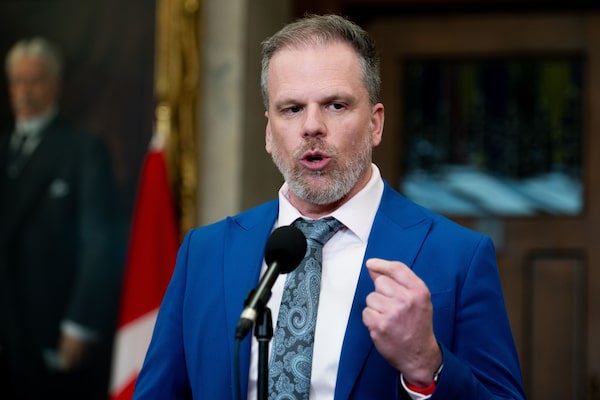
Mark Holland, Minister of Health, speaks to reporters in the Foyer of the House of Commons on Parliament Hill in Ottawa, on March 20.Spencer Colby/The Canadian Press
All 13 provinces and territories were part of Ottawa’s new health accord as of Wednesday after Health Minister Mark Holland announced a $3.7-billion health pact with Quebec.
Prime Minister Justin Trudeau first pitched a new health-funding deal to provinces more than a year ago to increase federal health transfers and provide targeted help.
The offer came as premiers and health workers raised the alarm about the ailing state of Canada’s health-care systems.
In exchange for the funds, Ottawa is requiring provinces to report on how the money will be spent and measure whether those funds are improving health outcomes for Canadians.
Quebec was the only province not to sign onto the deal in principle over concerns about the sovereignty of its health data, accusing Ottawa of overstepping its jurisdiction.
The deal Ottawa eventually reached with Quebec includes $2.5-billion over three years for health-care improvements, as well as $1.2-billion over five years to improve access to home care or a safe long-term care facility for aging Quebeckers.
The deals respect Quebec’s “exclusive jurisdiction” over health, the province’s Health Minister Christian Dube said Wednesday in a statement in French.
However, like other provinces, Holland said Quebec will still be required to show precisely how federal dollars are being spent on a shared list of health priorities, and provide annual, publicly available progress reports.
“Inside of that rubric is an enormous amount of flexibility, and the Quebec plan demonstrates that,” Holland said in an interview Wednesday.
The Quebec government plans to use the funds to help implement a health-care reform plan, but will continue calling for more federal funding.
According to the province, the federal share of health-care spending will decline from an estimated 21.9 per cent in 2024-25 to 20.7 per cent in 2032-33.
“It has to be said that the amount being provided is not at the level that we asked for,: Dube said in her statement.
“That said, we have the Quebec Health Plan and the sums provided for in these agreements will be used to support its deployment, which began more than two years ago.”
Now that Ottawa has signed deals with each province and territory, Holland said he’ll be getting his fellow health ministers together in the coming weeks to talk about next steps.
The accords will be different from past iterations because the provinces will be publicly reporting on their progress, using measured indicators, and providing detailed accounts of how the money’s being spent, he said.
“You achieve what you measure,” Holland said, describing the new framework as a “starting line” for new federal-provincial-territorial relationships on health care.
“We’re not just cutting a cheque.”
Provinces are expected to start reporting their progress in the fall of 2025, but Holland said many provinces are already making strides toward improving their health systems after the COVID-19 pandemic.
People shouldn’t expect to see immediate change, but Holland said he hopes to see incremental progress toward better health systems in Canada over time.
“If somebody tells you you can wave a wand and magically arrive in a different place, then they’re not being honest to you,” he said.
While governments will be working toward change as quickly as possible, he said they have to be “true and honest with both the challenges and the opportunities.”
– With files from Jacob Serebrin in Montreal